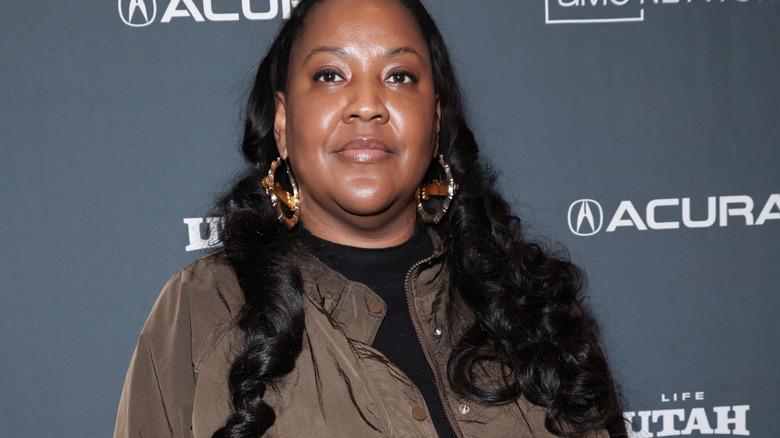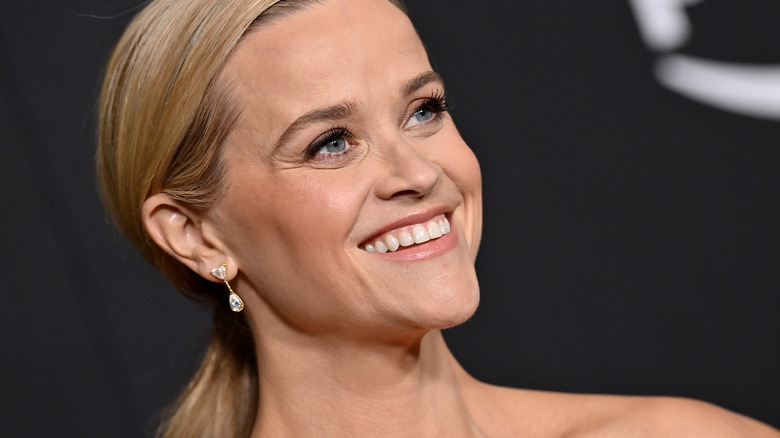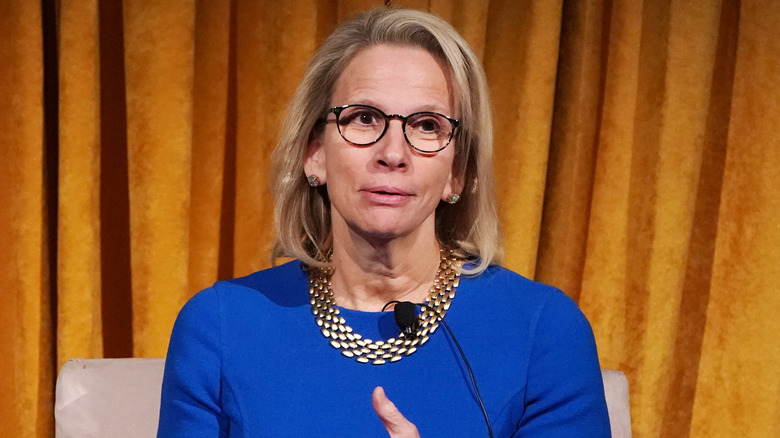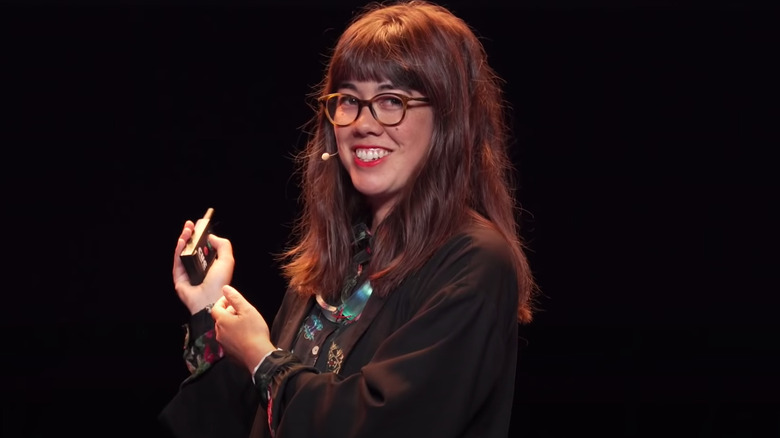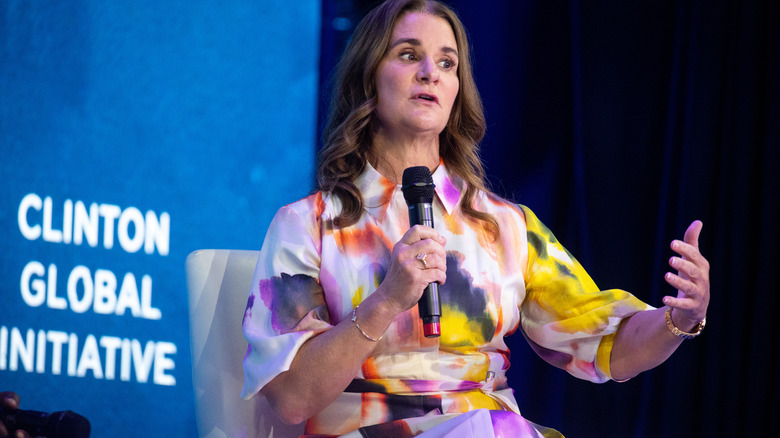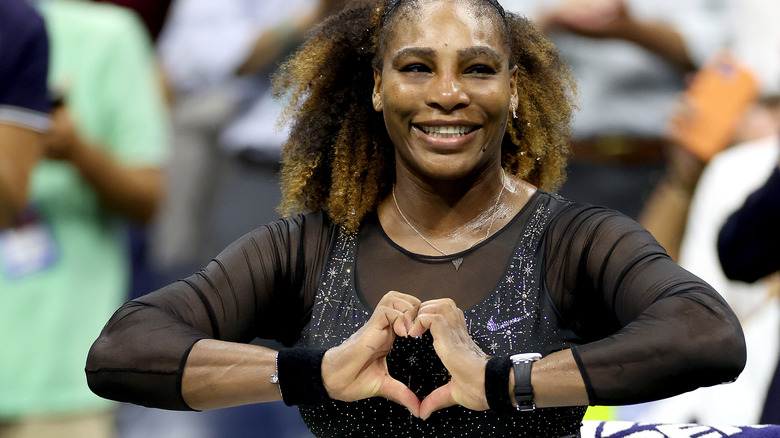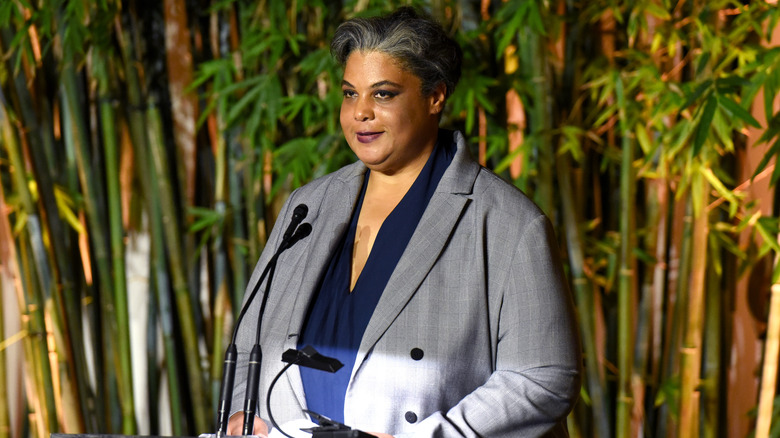10 Women Who Are Leading The Charge On Our Recovery From Girlboss Culture
In 2015, it seemed like everyone wanted to be a #girlboss. Created by entrepreneur-slash-author Sophia Amoruso, the girlboss archetype epitomized hustle culture. She was the sleek, sexy media mogul who always made time for spin class before her 7 A.M. meetings. She toted toxic positivity through Instagram graphics and relentlessly chased her goals. Today, the hashtag #girlboss sits just below 10 billion views.
The girlboss movement was once seen as a beacon of hope for women seeking to break through the glass ceiling and succeed in male-dominated industries. But over time, it's become clear that this movement promoted a shallow, individualistic version of empowerment. As a result, many women have begun to push back against the girlboss culture, demanding a more inclusive approach to female empowerment, and a chance to take a break once in a while. Sports writer Lindsay Gibbs offers a much more enticing call to arms on Twitter: "Stop glamorizing 'the grind' and start glamorizing getting 7+ hours of sleep at night, having healthy relationships, feeling safe at work, taking sick days, being paid a living wage, working hard when you're at work, boundaries, and self-caring your way to success."
Luckily, there is hope. The following 10 women are successfully leading the charge on our recovery from girlboss culture. These women come from a variety of backgrounds and industries, but they all share a commitment to promoting a more authentic and equitable vision of feminism.
Tricia Hersey wants you to take a nap
Tricia Hersey is revolutionizing the traditional notion of girlboss culture by empowering individuals — particularly women of color — to resist through rest. Hersey is the founder of The Nap Ministry, an initiative that uses rest as a form of resistance and healing. As a Black woman who has experienced the strain of hustle culture firsthand, Hersey believes that rest and self-care are critical ways to fight back against a history of forced labor and exhaustion that has disproportionately impacted Black women.
For Hersey, the connection between spirit, self, and community is inextricable. On her Instagram, she emphasizes the importance of collective care over self-preservation, believing that the path to liberation is a shared endeavor. She also adopts a Womanist framework, which asserts that the freedom of Black women is interconnected with the freedom of all people. Hersey's work is a necessary response to the burnout culture that often characterizes traditional girlboss narratives. By encouraging rest and self-care as a form of resistance, she empowers individuals to prioritize their well-being while challenging the oppressive systems that have long dictated societal norms. Her emphasis on collective care also helps to shift the focus away from individual success and toward community empowerment, a critical step in rewriting the narrative of girlboss culture.
Reese Witherspoon wants you to be messy
Reese has become a prominent figure in the fight for a more inclusive and varied representation of women in the media industry. Through her media company Hello Sunshine, Reese is committed to promoting women's stories, creating opportunities, and advocating for gender equality.
While speaking at the #SheIsEqual Summit in 2018, she shared her desire for a more diverse, accurate representation of women, "It's not just the art that's being made. It's how it's being made." In this way, she challenges one of the most deeply troublesome aspects of girlboss culture: that the only road to female empowerment and visibility is more work. It's not just about more female leads. Simply creating more female roles isn't enough. The world needs female leads that are messy, flawed, challenging, and real. Just like her iconic role as Elle Woods in Legally Blonde, Reese Witherspoon embodies the determination to break through the glass ceilings imposed on even the most successful and ambitious women.
AOC wants you to be loud
Congresswoman Alexandria Ocasio-Cortez is a symbol of hope and empowerment for women, particularly those who are marginalized and silenced in male-dominated spaces. Her rise to prominence as the youngest woman to ever serve in Congress was nothing short of inspiring, and her refusal to conform to rigid traditions has been a breath of fresh air for those seeking to rewrite the toxic narrative of girlboss culture.
One of the most striking examples of AOC's commitment to empowering women is her response to the sexist and violent language used against her by Congressman Ted Yoho. When Yoho called her a "f***ing b*tch" and "disgusting," as reported via The Guardian, AOC didn't back down or shrink away; instead, she took to the House floor and delivered a powerful speech condemning the culture that allows this kind of behavior to go unchecked. By speaking out in this way, she shows that true empowerment comes not from conforming to patriarchal norms but from challenging them and creating new, more equitable structures. As AOC said in her speech, "This is not new. And that is the problem. It is a culture of lack of impunity, of acceptance of violence and violent language against women, and an entire structure of power that supports that." By shining a light on this culture and refusing to accept it, AOC is helping to create a new narrative for women, one based on collective power, intersectionality, and a commitment to justice for all.
Michele Buck wants you to be inclusive
Michele Buck, the first female CEO of the Hershey Company, is making significant strides to create a more supportive and welcoming workplace for women. Buck's leadership has helped earn Hershey the title of the most female-friendly workplace globally, according to Forbes. Under her leadership, the company has made a concerted effort to increase gender diversity on its board, with women now accounting for 42% of its members. Hershey has set ambitious goals to further promote gender parity, aiming to have women make up 50% of its workforce and 42% of its leadership positions by 2025. (Forbes)
In addition to striving for gender equity, Hershey is committed to promoting a more supportive workplace that acknowledges women's real-life needs outside of work. To this end, the company recently launched the HSY Care Connect app. The app, developed in collaboration with the human resources team and women's business resource group, provides employees with resources for childcare, transportation, tutoring, and elder care. Through these efforts, Michele Buck and Hershey are helping to challenge traditional gender norms and promote a more inclusive corporate culture that empowers women and supports diversity in all its forms.
Jenny Odell wants you to do nothing
Jenny Odell is reshaping girlboss culture by championing a new, collective form of time management that emphasizes independence and free thinking. Her latest book, "Saving Time: Discovering a Life Beyond the Clock," explores the material roots of the adage "time is money" and how the modern workweek colonizes our lives. Rather than promoting the traditional productivity standards that often lead to burnout, Odell advocates for a more conscious, mindful approach to time management that prioritizes rest, reflection, and community.
Readers may remember Odell's championed book, "How to Do Nothing," in which Odell shows how to resist the attention-driven capitalist system by questioning the value of productivity in our lives. By challenging the traditional notion of time as a commodity to be bought and sold, Odell inspires readers to find joy in the present moment and connect with others in meaningful ways. Odell's ideas around collective time management work to alleviate some of the burdens of the "power mom" or the "one-woman show" that so many women fall into. By questioning whose time is considered valuable and whose time exists at the disposal of others in an interview with Ms. Magazine, Odell encourages women to rethink how we measure time and productivity. She recognizes that true liberation and empowerment come from embracing individuality while building strong, supportive communities that allow us to thrive.
Stephanie O'Connell Rodriguez still wants you to be ambitious
Stefanie O'Connell Rodriguez is a voice of reason in a world where pseudo-feminist narratives reign supreme. She has dedicated her work as a journalist to challenging the idea that women must be overworked and sacrificial to be successful. Instead, she advocates for equality in the workplace and highlights the ongoing biases and discrimination that keep women from reaching their full potential. In her piece for Glamour UK, Stefanie addresses the "ambition gap" and how it is often used to blame women for gender pay, wealth, and leadership gaps. She points out that even when women ask for pay raises at the same rate as men, they are less likely to receive them. This is due to the perception that women who negotiate and ask for more are seen as demanding and aggressive.
Stefanie also challenges the idea that ambition is synonymous with overwork, highlighting that ambition is simply the drive to create a life that reflects one's talent and potential. She emphasizes the valuation of our time and the recognition that our worth is not tied to our productivity or the number of hours we work. By vocalizing the nuances of sexism in the workplace and advocating for equality, Stefanie encourages women to be confident in their worth and demand equal treatment in the workplace. Through her work, she breaks down the stereotypes and expectations that have held women back for far too long.
Melinda Gates wants you to fight for equality
As a philanthropist and co-founder of the Bill & Melinda Gates Foundation, Melinda Gates has dedicated her efforts to promoting gender equality and empowering women worldwide through initiatives such as family planning and economic empowerment. In 2019 through a confessional written for Time Magazine, Melinda pledged $1 billion dollars allocated over 10 years to "expanding women's power and influence in the United States." She does this through her company Pivotal Ventures, which focuses on systemically removing barriers that keep women from reaching their full professional potential.
Melinda sees a big gap in the professional world that girlboss culture missed. It's not just about getting up earlier and working later. It's about addressing the deeply rooted cultural and logistical blocks that make success easier for some than others. Through Pivotal Ventures, Melinda Gates focuses on promoting improved policies and safeguards for women in the workplace.
Serena Williams wants you to follow your heart
The renowned tennis player, Serena Williams, has been a vocal advocate for gender equality and women's empowerment both on and off the court. She has fought for equal pay in tennis and uses her platform to address social issues affecting women. Plus, her recent retirement from the sport was a proud showcase that choosing your life over work is ok.
In her self-written piece for Vogue, Serena shares candidly about her decision: "Believe me, I never wanted to have to choose between tennis and a family. I don't think it's fair. If I were a guy, I wouldn't be writing this because I'd be out there playing and winning while my wife was doing the physical labor of expanding our family." By retiring from her exceptional tennis career, Serena Williams challenges the conventional notion of success and demonstrates that stepping away from one's profession does not diminish one's value or influence.
Miya Tokumitsu wants you to challenge work culture
As an author and cultural critic, Tokumitsu challenges societal norms and sheds light on the exploitative nature of work culture, particularly in her book "Do What You Love and Other Lies About Success and Happiness." Her work critically examines the intersection of gender, labor, and capitalism, highlighting how traditional notions of success can perpetuate inequality and exploitation.
In an interview with The Atlantic, Tokumitsu questions our modern obsession with blissful, uber-successful figureheads like Gwenyth Paltrow and Steve Jobs. As a trained art historian, she became fascinated by how glorified and pervasive these images have become in America. "Work is held up as something that is more revelatory about your character than the interests you have or the way you care for other people. ... but it leads to this culture where people are just working all the time." In this way, Miya opens the door to a conversation about our obsessions with work and how often we attach our sense of self to our professional drive.
Roxanne Gay wants you to be a bad feminist
Roxane Gay is a writer, professor, and feminist commentator who challenges the uninclusive aspects of girlboss culture and white feminism. Through her work, most notably her acclaimed book Bad Feminist, she highlights the importance of intersectionality and inclusivity in feminism. Gay promotes the idea that empowerment should not be limited to individual success but should also involve dismantling systemic barriers that hold women back.
In her book's introduction, she candidly embraces the label "bad feminist," affirming the title "because I am flawed and human." She often felt that as a queer black woman, feminism was not inclusive of her. Now, through her hilarious and insightful writing, she's making feminism more inclusive, another huge gap that the pervasive girlboss culture missed.

